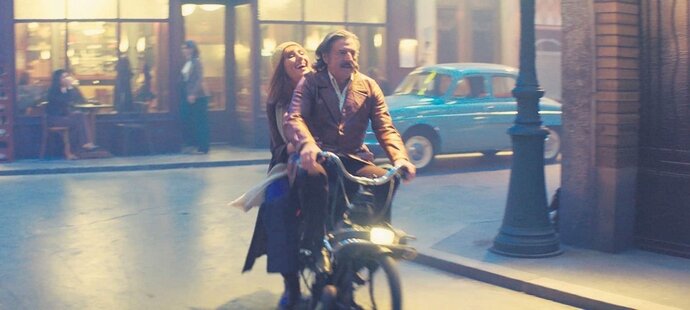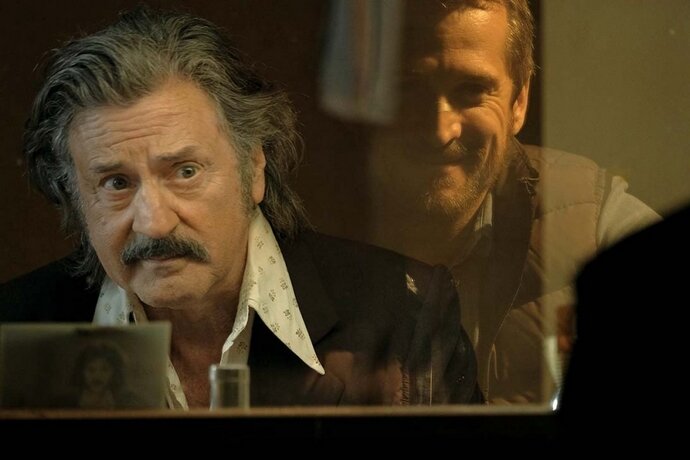What IS love?
While fairytales have often presented it as a straightforward happily ever after, us living in the real world know it’s a lot more than an awakening kiss or love at first sight.
But even so, in many ways, La Belle Epoque can be likened to an adult fairytale, ruminating on what it means to fall - and more importantly - be in love. It’s got the initial disappointments and personal revelations. It’s got characters dreaming of a better outcome. It’s at once surreal and relatable at the same time. There’s even a few lessons tucked away in there.
Nicolas Bedos infuses this post modern-day satire with plenty of whimsy, and of course, enough sharp French wit and sass to dice up the timeless topic. Delivering a rare elegant meeting of comedy and philosophising, La Belle Epoque is the romantic farce that stirs up important questions on what makes a relationship a relationship.

La Belle Epoque is more commonly known as a period in French history between 1880 and the start of World War I in 1914 when the country flourished. It was a peaceful time, where colonialism brought Europe unprecedented prosperity and clout, while experiencing a blossoming in innovation and art. It was a Golden Era, until the war took it all away.
Bedos layers this idea over the film with an intriguing set-up - that of a company that offers ‘time travel’ through vivid recreations for those with plenty of cash to spare. A golden chance in itself to experience the best encounters. It allows participants to experience life in another place and another time, and even be a person they’ve always wanted to be.
But while historic buffs aimed to be Marie Antoinette, and others opted to have a binge-drinking session with Ernest Hemingway, the aging illustrator Victor (Daniel Auteuil) had a very different wish - to relive the time when he first met his wife, Marianna (Fanny Ardant). And as sweet as it sounds, the reason why Victor is doing so is because his wife just kicked him out of the house.

After 25 years of marriage, Marianna is tired of her old-fashioned husband. While she lauds technology through its many permutations - the intelligent algorithm used for her therapy practice, her personal viewfinder for nightly relaxation - Victor seems stuck in what she considers unabated nostalgia. He complains about the cold nature of the GPS for example, or bemoan flicking through screens instead of actual books. This no doubt highlights the issues the generation gap has in our real world.
Lucky for Victor, the owner of the ‘time travel’ company happens to be a good childhood friend to his son, and Antoine (Guillaume Canet) is eager to offer the experience in gratitude for the many kindness Victor has shown him as an incidental surrogate parent. The fastidious screenwriter restages the encounter in detail with help from Victor’s drawing, and convinces his own star performer and girlfriend Margot (Doria Tillier) to play the role of the young Marianne.

But as with all things to do with love, our characters all wade into complicated territory, and eventually find themselves with personal epiphanies that alter their feelings they were first presented with.
The biggest appeal of La Belle Epoque is both in its Truman Show-esque premise, where one gets bizarre encounters from the theatrical recreations, as well as the effortless way Bedos melds humour and irony into the parallel situations.
For the first, one gets a peek at the production crew, long-suffering under the fussy Antoine who insists on split-hair levels of authenticity. Their wry observations are as funny as their amused resignation, not unlike muttered complaints from employees that are nothing but true.
At other times, they become like voices in the head when they question the ethics behind Antoine’s business, especially when it features controversial characters or behaviour having to do with characters like a certain notorious German tyrant. There are standouts here, like the sexually-depraved nerd assistant, but there are equally enjoyable moments from the many calefare actors who struggle with their roles, like the Hemingway actor who can’t drink.
As for the humour - the film is raining with it. Whip-fast, rude, yet oh-so-French honest, the script leaves one breathless with the many punchlines that keeps coming. While the story has the characters going through emotional revelations about their feelings, their conversations and self-talk have so much candour, it almost feels voyeuristic listening in.

It helps that Marianne and Margot are sassy women, quick to wield their wiles and confront their partners on their stubborn resistance. Their thoughts are progressive, like Marianne who quickly has her new lover move in, only to have life’s reality fail her at every turn. One scene in mid-copulation, she asks to be looked upon as heaven’s gate, only to have the guy tell her that he needs to wear his glasses.
Margot also has her hang-ups with an overbearing Antoine, and threatens to leave him constantly. And yet when he doesn’t react as she thought he would (she throws Antoine’s walking cane out but he doesn’t blow up because he claims to have started meditation), she realises she may be the one who hasn’t moved on.
So while the revelations that come with romantic dramas are there, La Belle Epoque’s quick-fire treatment makes this an easy watch and an easier film to love. The characters here have hang-ups yes, but their open-hearted discoveries are a joy to share in, especially when presented as smart quips and bite-sized philosophies.
If you need a convincing reason to believe in love again, La Belle Epoque might just have enough honesty to let that happen for you.






